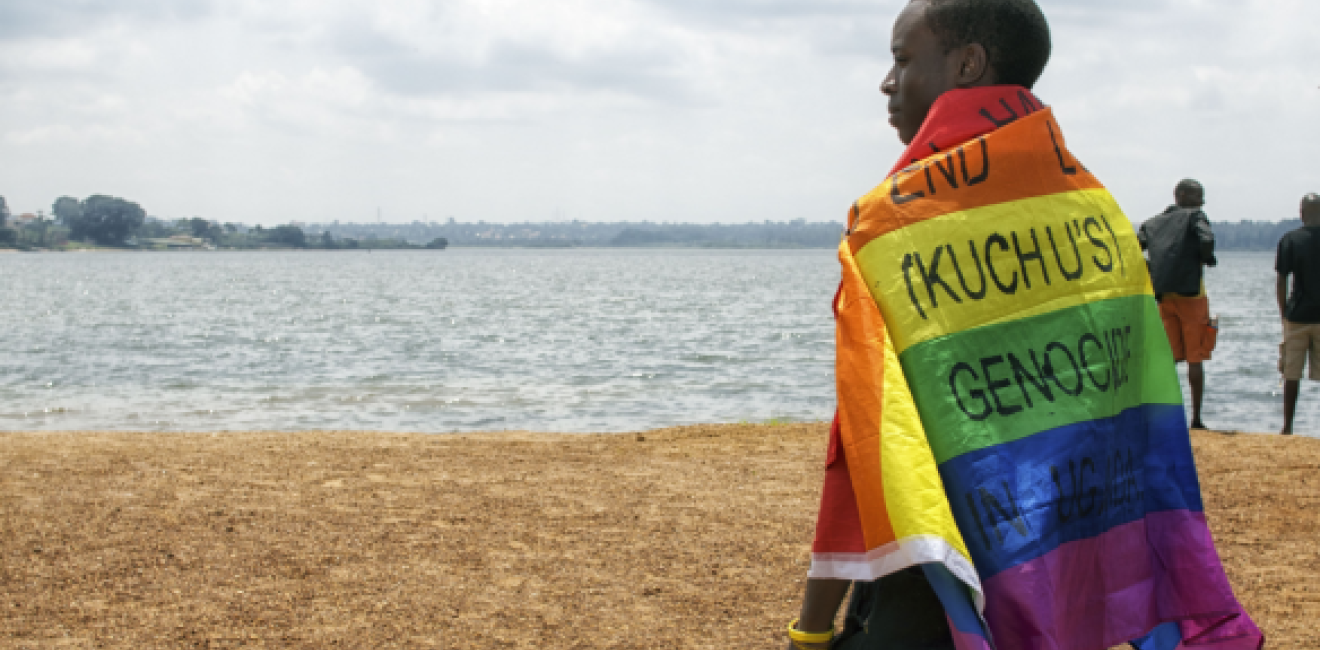
A blog of the Africa Program
On March 21, Uganda's Parliament passed the 2023 Anti-Homosexuality Bill, widely hailed as among the world's harshest anti-gay laws. Though same-sex relations were already illegal in the country, this bill further cracks down on LGBTQ+ rights. It imposes the death penalty for "aggravated homosexuality" (including sex when the "offender" is a person living with HIV), mandates life in prison for those convicted of homosexual relations, instates a 20-year prison sentence for the promotion or abetting of homosexuality, and requires by law that family, friends, neighbors, and healthcare workers report the homosexual relations of their loved ones or face up to six months of jail time.
This law has significant human rights impacts, including decreased access to health services for LGBTQ+ individuals. Activists warn that the legislation could criminalize inclusive HIV efforts, undermining global efforts to end AIDS by 2030.
History of the Legislation
This isn't the first time a harsh anti-homosexuality act has appeared on the floor of Uganda's Parliament. The initial iteration of the act was introduced in 2009 after significant lobbying by American evangelicals. Though nations like the U.S. attempted diplomatic intervention against the bill, it was signed into law five years later–only to be struck down on a technicality. The law's dismissal on procedural grounds has left the possibility of new anti-gay legislation, an opening that Uganda's Members of Parliament have now taken advantage of.
The 2023 bill has yet to be signed by President Yoweri Museveni. However, if the past is any indicator, signs point toward his signature of the bill. In 2014, Museveni signed the initial iteration of this bill into law. Though the bill was later struck down, Museveni has continued his anti-gay rhetoric. In a presidential address to Parliament this past March, Museveni described gay people as "deviants" and called on the West to "stop impos(ing) their practices on other people."
On April 20, Museveni sent the bill back to Parliament for improvements after congratulating the body on their "strong stand" against homosexuality. He claimed to have no issues with the punishments set out in the bill, but rather with the fact that the bill has no provisions for the "rehabilitation" of LGBTQ+ individuals who "would like to live normal lives again." It is yet to be seen what exact changes will be made to the bill, but it appears as though such changes would prompt Museveni to sign the bill, as he otherwise "totally agree(s)" with the legislation.
Health Impacts
Today, 1.4 million Ugandans live with HIV, with millions more at risk of infection. LGBTQ+ individuals are among the most vulnerable to the disease. In 2021, 51% of new HIV cases in Sub-Saharan Africa occurred in key vulnerable populations and their sexual partners, including men who have sex with men, sex workers, people who inject drugs, and transgender people.
This new legislation will drive vulnerable LGBTQ+ communities away from testing and life-saving services due to fears of being outed and arrested, directly affecting HIV rates. Research shows that the criminalization of homosexuality in Sub-Saharan Africa increases the incidence of HIV among LGBTQ+ populations. In countries that criminalize homosexuality, men who have sex with men have a five times greater incidence of HIV than men who have sex with men in countries without such laws. The harsh crackdown proposed in Uganda's 2023 legislation will only further contribute to this inequity between Uganda and its neighbors without anti-gay laws.
The legislation will also obstruct healthcare workers from providing HIV prevention resources, testing, and treatment. According to Asia Russell, Executive Director of NGO Health GAP, healthcare workers attempting to implement LGBTQ+ inclusive HIV programming "risk prison time, steep fines, and the ethical nightmare of having to report fellow Ugandans simply for doing their job."
Concerns of obstructed health work are not without historical basis. In April 2014, just after the 2014 Anti-Homosexuality bill was passed, Ugandan police raided a U.S.-funded HIV healthcare provider and arrested an employee for "training youths in homosexuality." This incident raised concerns about anti-gay laws driving the arrest of healthcare workers and the seizure of confidential health records that could out numerous LGBTQ+ patients.
Implications for the Implementation of PEPFAR
The United States President's Emergency Plan for AIDS Relief (PEPFAR) is credited with saving millions of lives and altering the global trajectory of the HIV epidemic. PEPFAR currently invests about $400 million annually to support Uganda's HIV response and provides prevention, testing, and treatment services through inclusive clinics. Among the 1.4 million Ugandans living with HIV, 1.3 million receive PEPFAR-supported treatment.
According to Russell, the bill will make some PEPFAR-funded programs in Uganda "completely illegal." A halt in PEPFAR implementation will seriously affect the health of Uganda's population, simultaneously thwarting the country's progress in eradicating HIV and impeding PEPFAR's aims of controlling the epidemic globally.
Policy Interventions: Are Aid Cuts the Answer?
In 2014, the World Bank and countries including the United States, Norway, Sweden, the Netherlands, and Denmark suspended or redirected aid in response to Museveni signing off on Uganda's anti-homosexuality legislation. Though these actions were targeted toward censuring breaches in human rights, such aid restrictions had devastating impacts on the health of all Ugandans–LGBTQ+ or not.
Thus far, no government or multilateral organization has restricted aid to Uganda in response to Parliament passing the 2023 Anti-Homosexuality Bill. However, some may choose to do so if Museveni signs the bill, mirroring their 2014 decision of waiting until the bill was signed and enacted by the president before cutting aid.
Today, the U.S. government is the single largest donor to Uganda's health sector, contributing 32% of total health spending in Uganda annually. Halting this funding will prevent millions of Ugandans from receiving necessary healthcare. According to Shantal Mulungi, executive director of Coloured Voice Truth, if the Joint United Nations Programme on HIV/AIDS and the United States halt their HIV and AIDS services in Uganda, "then automatically all patients on ARVs (antiretroviral drugs) will be sentenced to death."
Cutting aid to Uganda could also heighten violence and hatred against LGBTQ+ people, who may be portrayed as the scapegoat for aid cuts.
Alternative Interventions: What Do Activists Suggest?
Many Ugandan LGBTQ+ activists in both 2014 and today advocate for alternative interventions to aid cuts, which could disproportionately impact the health of vulnerable LGBTQ+ populations.
Nicholas Opiyo, Executive Director and Lead Attorney of Chapter Four Uganda suggests sanctions that target leaders involved in all forms of human rights violation. Some examples of human rights violations in Uganda today include unlawful or arbitrary killings, denial of a fair public trial, restrictions on freedom of expression, and more. By considering all human rights abuses, not just abuses against LGBTQ+ individuals, Opiyo suggests that international actors can ensure that their interventions don't single out LGBTQ+ people as the only Africans the international community cares about, thus preventing further animosity against LGBTQ+ people.
Dr. Frank Mugisha, Executive Director at Sexual Minorities Uganda, suggests a suite of actions that could prevent the spread of anti-gay rhetoric throughout the continent. These interventions include holding religious leaders accountable for spreading hatred, imposing travel restrictions against those spreading anti-gay rhetoric, exposing extreme anti-gay groups from outside of Africa that are advocating on the continent, and directly supporting activists on the ground.
Mulguni suggests that the United Nations back up campaigns for LGBTQ+ equality with international law enshrining LGBTQ+ rights. Alternatively, she suggests that the UN impose measures that force nations to comply with the human rights treaties they have signed. "That is the permanent solution," she said. "Sanctions and all that will not solve this problem."
The global community can support the work that these activists are doing in Uganda through the power of strong bilateral partnerships and value-oriented policy. Future interventions should focus on supporting, rather than further harming, Ugandans of all sexual and gender orientations.
Amanda Clark is the Staff Intern at the Wilson Center Africa Program for the Spring 2023 term (January-April). She is a recent graduate of Muhlenberg College, where she received a BA in Sustainability Studies with a focus on international sustainable development.
Photo Credit: Gay Pride, Uganda, Africa 2014. Held in secret by Lake Victoria, Entebbe, following ruling of homosexuality laws in Uganda. iain statham/Shutterstock.com
The opinions expressed on this blog are solely those of the authors. They do not reflect the views of the Wilson Center or those of Carnegie Corporation of New York. The Wilson Center's Africa Program provides a safe space for various perspectives to be shared and discussed on critical issues of importance to both Africa and the United States.
Author


Africa Program
The Africa Program works to address the most critical issues facing Africa and US-Africa relations, build mutually beneficial US-Africa relations, and enhance knowledge and understanding about Africa in the United States. The Program achieves its mission through in-depth research and analyses, public discussion, working groups, and briefings that bring together policymakers, practitioners, and subject matter experts to analyze and offer practical options for tackling key challenges in Africa and in US-Africa relations. Read more

Explore More in Africa Up Close
Browse Africa Up Close
The Innovative Landscape of African Sovereign Wealth Funds



